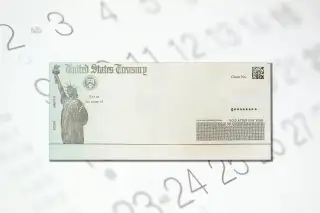Is the IRS Almost Done Sending out Stimulus Checks?

The monumental stimulus check program, which has been paying up to $1,200 per adult to provide economic relief during the coronavirus pandemic, appears to be coming to a close.
When will the last stimulus check be sent? The IRS hasn't said for sure. But if the next few weeks pass and you still haven't gotten a payment from the government, you may be out of luck.
The first wave of stimulus checks was issued in mid-April, sent to taxpayers via direct deposit. As of May 18, the Treasury Department says that it had already sent "more than 140 million Economic Impact Payments worth $239 billion to Americans by direct deposit to accounts at financial institutions, Direct Express card accounts, and by check."
What's more, the Treasury Department, which oversees the IRS, said it was sending out nearly 4 million additional payments via prepaid debit card during the week leading up to Memorial Day. The IRS has estimated that it will be delivering a total of roughly 150 million stimulus payments overall, as part of the $2 trillion CARES Act, which provides a wide range of relief funding to taxpayers and businesses.
In other words, according to our back-of-the-envelope math, about 95% of all the expected stimulus payments will be accounted for and delivered by Memorial Day weekend. Fewer than 10 million stimulus checks — or "Economic Impact Payments," to use the IRS's preferred phrase — will still need to be sent out, and that number could be closer to 5 million.
The deadline for giving your direct deposit info to the IRS has already passed. So it can be safely assumed that most people getting a stimulus payment from now on will receive a paper check or debit card in the mail. We also know that the IRS is capable of issuing around 5 million paper checks per week.
What all of this means is that the IRS should be completely done sending out stimulus check payments by mid-June, or perhaps even by the end of May.
(Neither the IRS nor the Treasury Department has made any statements regarding when the last stimulus payment will be sent. Money has reached out for comment, and we will update this story if we get a response.)
If this timeline holds up, the IRS will be far ahead of the expected schedule. Originally, many observers estimated that it would take upwards of 20 weeks for the IRS to send out all of the stimulus payments. That would have meant that some people wouldn't get their checks until August or September.
Apparently, one way that the IRS has sped up the processing and delivery of stimulus checks is by issuing many of them by direct deposit rather than mailing out old-fashioned paper checks. In April, a freshly launched IRS portal began collecting bank direct deposit information through the Get My Payment app and a special online form for non-tax-filers. The agency then expedited as many payments as possible via direct deposit to eligible recipients.
Why You Didn't Get a Stimulus Check
The vast majority of stimulus check recipients should have already received their payments. What happens if you didn't get a check yet? Why might you not be getting a check at all?
The simplest answer could be that you're just not eligible for a stimulus check. As Money has previously reported, you won't receive an Economic Impact Payment if your income is too high according to your most recent tax return. The IRS's information center lists a long string of other people who are also not eligible for payments, including anyone over the age of 16 who can be claimed as a dependent on someone else's tax return (such as a college student); anyone without a Social Security number; and anyone who is incarcerated or a "nonresident alien."
Here are some of the other situations that might mean you won't get a stimulus check, or that the payment amount is different than what you expect:
• You owe money to the bank where the payment was sent, and the bank takes the funds before you can get your hands on it. Yes, this can happen, and apparently it's legal.
• You owe child support that's past due — in which case, the IRS says your payment could be offset or reduced based on how much you owe.
• There's a mistake in your most recent tax return, which led to a mistake with your stimulus check. The IRS lists a whole host of related reasons why your payment could be different than anticipated; in many cases, if you received less than you were due, everything will be squared away when you file your 2020 tax return.
More From Money:
Will You Get a Second Stimulus Check for Coronavirus?
The IRS Wants Some People to Mail Back Their Stimulus Checks